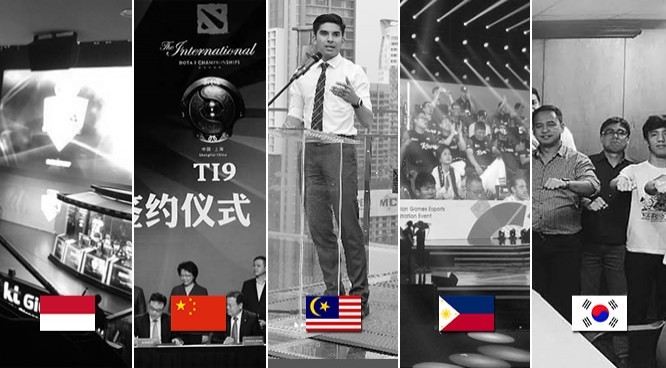Esports is a very young industry that often struggles to claim it’s spot on the limelight despite years of struggle. Actions like hosting multi-Million Dollar tournaments, including esport titles in a medal event at the Asian Games, and broadcasting it to an estimated viewer base of 215 Million people are just some of the steps that have enabled esports to go mainstream.
However, there is one more entity that needs to acknowledge and encourage the growth of esports for it to truly flourish: the government. While not many governments have noticed and publicly supported esports, there are a few countries who have already started the trend.
Here are 5 national governments that support esports in their country.

Image Credits: The Esports Observer
The Indonesian government recognised and started supporting esports way back in 2014 when it established the Indonesia eSports Association (IeSPA) as a formal entity under the State Ministry of Youth and Sports Affairs.
Since then they’ve supported esports in a number of ways, the biggest of which was hosting the Asian Games 2018 in which esports was a demonstration event. This is by far, the biggest platform that esports has had in the eye of the casual sports fan and it wouldn’t have happened without the support of the Indonesian government.
The IeSPA continues to support Indonesian esports athletes who represent the country in global events and regularly coordinates with the government to ensure the growth of Indonesian esports.

Image Credits: ABS CBN
The Philippines is one of the few countries in the world where top-tier esports players are considered as bona fide athletes underneath the country's legislation. This helps ease the players' struggles in getting visas to LAN events in other countries -- a perennial problem for esports players in the region.
The country has also established the National Sports Association (NSA) and the Esports National Association of the Philippines (ESNAP) to promote the growth of esports in the country starting with the recruitment of national team members from the inaugural league.
The Philippine Olympic Committee president, Ricky Vargas, has also publicly supported the creation of the NSA, and successfully sought to include esports in the SEA Games 2019 as a medal event.
Despite recent controversies, esports in the Philippines has only become bigger and better.

Image Credits: The Esports Observer
China was an early adopter of esports. The country hosted major international tournaments like the Electronic Sports World Cup and the World Cyber Games way back in the late 1990s, paving the way for its growth. By 2003, China’s General Administration of Sports (GSA) had already declared esports as an official sport.
While the esports industry stagnated a bit, the GSA finally started organizing national esports competitions in 2010. It also encouraged other private entities to organize their own esports tournaments paving the way for more top-tier international tournaments in China. In 2012 and 2013, The GSA helped host the World Cyber Games.
People’s Daily, the state-owned newspaper, published an article in February 2015, titled “E-sports Should Not Be Seen the Same As Gaming Addiction.” It argued esports was “good for young people,” just like soccer.
They also continue to provide support to esports by inviting esports organizations like Riot and Valve to host their annual World Championships in some of their biggest stadia including the Mercedes Benz Arena, Shanghai and the Beijing National Stadium. It is no surprise that they’re one of the world leaders in esports.

Image Credits: Stadium Astro
While China may have invested in esports significantly earlier, Malaysia has picked up the pace and has started investing tons of money into developing the country’s esports infrastructure. Over the past year, Malaysian esports has seen a rapid growth in terms of investment and publicity.
The first government entity to fund esports was the State government of Penang who announced RM 1 Million for the development of esports. Then we saw them host the Malaysian Cyber Games, where the Malaysian Prime Minister batted for the development of esports. Then they appointed an avid Dota 2 player, Syed Saddiq Abdul Rahman, who promised to develop esports in Malaysia, as the Minister for Sports. After his appointment, Malaysian esports has received an unprecedented amount of funding from the central government ($2.4 Million) and other private entities.
It is clear that the future is bright for esports in Malaysia.

South Korea can be called the birthplace of esports. While esports might have grown by leaps and bounds across the world now, it all started in the 1990s in South Korea. The country was actually struggling financially, so the government decided to invest in internet infrastructure. Broadband internet became the norm, and slowly competitive gaming began to rise.
Shortly after, South Korean TV networks began broadcasting these games (thanks to government support), and the exponentially increasing popularity saw esports become the national pass time. The Korea e-Sports Association (KeSPA) was also established by the South Korean government to help develop esports.
A partnership between the government and Blizzard saw them coordinating to organize live LAN tournaments for Starcraft. It started with events organized in small PC bangs and grew into hotel ballrooms. Slowly the events began being hosted in stadiums and professional esports players began being respected as they grew in numbers.
Now, professional gaming is a dream job in South Korea. People talk about professional gamers the same way that they do about major actors or K-Pop stars. They are celebrities, household names in most South Korean homes. In fact, it is rumoured that the South Korean Men's National Football team, during the World Cup, were honoured to meet the top Starcraft players, who the footballers revered as their heroes, to boost their morale.
It was all thanks to the support that the South Korean government has given to esports. Even now, the government is still vigilant about esports and gaming, constantly introducing new laws to help prevent abuse while refining processes to stimulate the growth of, esports.
